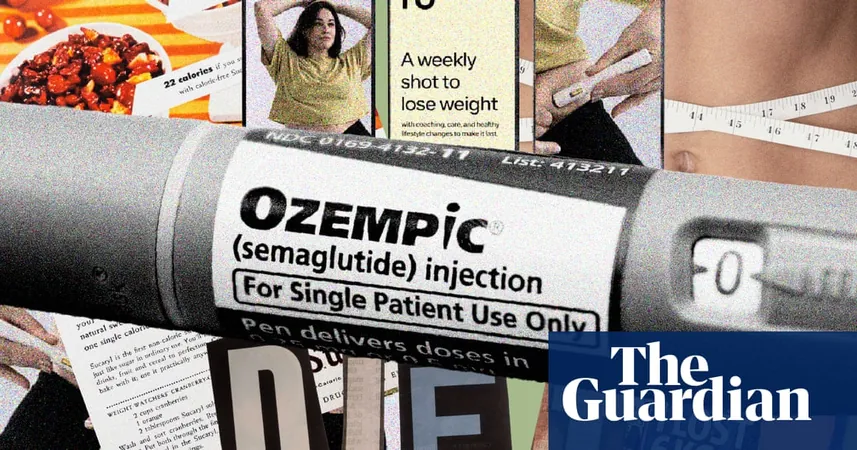
The Ozempic Dilemma: Miracle Weight Loss Drug or Catalyst for Eating Disorders?
2025-04-04
Author: William
Introduction
In just three short years, GLP-1 drugs like Ozempic have transformed societal attitudes towards body image, sparking a renewed obsession with thinness that has been linked to the decline of the body positivity movement and even the shuttering of indulgent establishments like wine bars. Initially hailed as a godsend for individuals needing to lose weight for medical reasons, these drugs have rapidly gained traction among the general public, with approximately one in eight Americans reportedly trying them. Meanwhile, telehealth companies are flooding the market with affordable alternatives, often without rigorous oversight.
How Ozempic Works
Ozempic, which contains the active ingredient semaglutide, operates by mimicking a natural hormone that not only stimulates insulin production but also decelerates stomach emptying, enhancing feelings of satiety. However, these same features that make GLP-1s effective for weight loss also raise significant concerns, particularly for individuals battling eating disorders.
Expert Opinions
Experts, including Dr. Kimberly Dennis, a psychiatrist specializing in eating disorders, warn that these injections could effectively serve as a catalyst for disordered eating behavior. “These drugs are rocket fuel for people with eating disorders,” she asserts, noting alarming cases of "drug-induced" anorexia surfaced within medical communities. As access to GLP-1 medications becomes alarmingly easy through telehealth platforms—which often involve minimal health scrutiny—there's a rising fear that people seeking a quick weight-loss solution may unwittingly precipitate or exacerbate their eating disorders.
Psychological Impacts
Psychologist Pamela Keel from Florida State University emphasizes that those with restrictive eating disorders should never be prescribed appetite suppressants. “We are not interested in helping people do a better job of having an eating disorder,” she states unequivocally. Compounding this, medications like Ozempic, which encourage lower food intake, might also inadvertently heighten risky behaviors, such as purging.
Complex Repercussions
The repercussions are complex. While some individuals might find relief from binge eating disorders—conditions that are far more common than anorexia—others risk triggering or relapsing into restrictive eating patterns. Interest in the effects of GLP-1s is growing, but the long-term impact specifically on eating disorders remains unclear. Initial research indicates that while some may find a valuable ally in these drugs, the potential for relapse remains high, especially for those with a history of disordered eating.
Personal Stories
Take the case of Lily, a 30-year-old diagnosed with adult-onset type 1 diabetes after struggling with binge eating tendencies. Although her doctor prescribed Ozempic to manage her diabetes, Lily had a decade-long history of anorexia, which led to a troubling relapse after starting the drug. Thankfully, she navigated out of her predicament with guidance from her mental health professionals, but the emotional turmoil of navigating her eating disorder alongside her need for diabetes management weighed heavily on her.
The narrative does not only revolve around misuse and danger; for some, Ozempic has brought relief from the compulsive tendencies of binge eating. Megan, a nurse who struggled with cycles of binging and purging, found a transformation in her relationship with food after starting a GLP-1 medication. The medication alleviated her relentless cravings and allowed her to recognize the biological triggers behind her compulsion to eat excessively, effectively helping her separate the disorder's psychological impact from bodily sensations.
Cultural Pressures and Mental Health
Yet, cultural pressures surrounding body image and weight persist, feeding into the narrative that thinner equates to healthier. This complex relationship between body image, societal expectations, and the medication consumption underlines the urgency for healthcare providers to screen for disordered eating histories thoroughly before prescribing such weight loss drugs. If patients only possess a history of eating disorders, it necessitates careful evaluation to weigh the potential benefits against risks.
Conclusion
Lily's experience continues to be a cautionary tale—that even those who require medical intervention should be met with holistic care that considers their mental health. "This has been one of the most confusing things that I’ve ever done to my own body," she reflects, highlighting the ambivalence many feel toward using a drug that both assists and complicates their health journey.
As society grapples with the rapid rise of GLP-1s like Ozempic, it becomes imperative to monitor their impact not only on physical health but also on mental well-being. The balancing act between managing medical conditions and addressing mental health factors is delicate, exemplifying the necessity for a nuanced approach to weight loss medications amid a growing epidemic of eating disorders.
Resources
If you or someone you know is struggling with an eating disorder, resources are available, and seeking help is a crucial first step. In the U.S., visit nationaleatingdisorders.org or call the Eating Disorders Hotline at 800-375-7767 for support.









 Brasil (PT)
Brasil (PT)
 Canada (EN)
Canada (EN)
 Chile (ES)
Chile (ES)
 Česko (CS)
Česko (CS)
 대한민국 (KO)
대한민국 (KO)
 España (ES)
España (ES)
 France (FR)
France (FR)
 Hong Kong (EN)
Hong Kong (EN)
 Italia (IT)
Italia (IT)
 日本 (JA)
日本 (JA)
 Magyarország (HU)
Magyarország (HU)
 Norge (NO)
Norge (NO)
 Polska (PL)
Polska (PL)
 Schweiz (DE)
Schweiz (DE)
 Singapore (EN)
Singapore (EN)
 Sverige (SV)
Sverige (SV)
 Suomi (FI)
Suomi (FI)
 Türkiye (TR)
Türkiye (TR)
 الإمارات العربية المتحدة (AR)
الإمارات العربية المتحدة (AR)